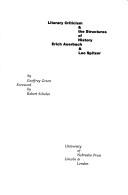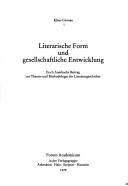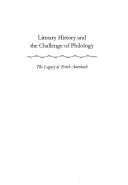| Listing 1 - 10 of 15 | << page >> |
Sort by
|

ISBN: 0803221088 Year: 1982 Publisher: Lincoln University of Nebraska press
Abstract | Keywords | Export | Availability | Bookmark
 Loading...
Loading...Choose an application
- Reference Manager
- EndNote
- RefWorks (Direct export to RefWorks)
Book
ISBN: 9782878544596 2878544595 Year: 2009 Publisher: Paris: Presses Sorbonne nouvelle,
Abstract | Keywords | Export | Availability | Bookmark
 Loading...
Loading...Choose an application
- Reference Manager
- EndNote
- RefWorks (Direct export to RefWorks)
Auerbach, Erich --- Literature --- History and criticism --- Auerbach, Erich, --- Belles-lettres --- Western literature (Western countries) --- World literature --- Philology --- Authors --- Authorship --- Oʼerbakh, Erikh, --- אוארבך, אריך --- אוארבך, אריך, --- Literature - History and criticism - Congresses --- Auerbach, Erich, - 1892-1957 - Congresses --- Auerbach, Erich, - 1892-1957 - Bibliography --- Auerbach, Erich, - 1892-1957
Book
ISBN: 9783110985863 Year: 2023 Publisher: Berlin ; Boston : De Gruyter,
Abstract | Keywords | Export | Availability | Bookmark
 Loading...
Loading...Choose an application
- Reference Manager
- EndNote
- RefWorks (Direct export to RefWorks)
Figures emerge from movement. We live and think in figures. This monograph pursues the literary, theological, and philosophical traces of the concept of figura in comparative constellations from antiquity to modernity, starting with Erich Auerbach, developing them into a method of literary-philosophical figuralogy and opening up a compendium of connections between conceptual history and literary theory. Worüber wir reden, wenn wir von Figuren reden, ist eine komplexe Fragestellung, die unterschiedliche Disziplinen berührt. Mit Erich Auerbachs figura/Mimesis-Projekt wurde die interdiszplinäre Forschung dieses Begriffs initiiert. Ob Literatur-, Bild- oder Wissensgeschichte – die Präsenz und Aktualität von figura in der romanistischen und komparatistischen Forschung bezeugt ein anhaltendes Interesse an der Theoriearbeit zwischen Theologie, Philosophie, Literatur- und Kunstwissenschaft. Allerdings fehlt bislang eine grundlegende methodologische Reflexion, die die interdisziplinären Aspekte gleichrangig berücksichtigt und zu einer gemeinsamen Arbeit am Begriff vereinigt. Dieses Versäumnis zu beheben, ist Aufgabe der vorliegenden Arbeit. Ausgehend von Erich Auerbach, Walter Benjamin und Hannah Arendt verfolgt die Monographie in vergleichenden Konstellationen von der Antike bis in die Moderne die literatur- und kunsthistorischen, theologischen und philosophischen Spuren von figura, die zu einer Methode der literaturphilosophischen Figuralogie ausgebaut werden. Ecce figura versteht sich als ein Kompendium interdisziplinärer Begriffsgeschichte zwischen Literatur, Philosophie und Theologie, das dazu einlädt, in neuen Konstellationen gelesen und erweitert zu werden.
LITERARY CRITICISM / European / General. --- Auerbach, Erich. --- conceptual history. --- figura. --- literary theory.
Book
ISBN: 9791037002860 Year: 2020 Publisher: Paris : Hermann,
Abstract | Keywords | Export | Availability | Bookmark
 Loading...
Loading...Choose an application
- Reference Manager
- EndNote
- RefWorks (Direct export to RefWorks)
Biographies littéraires croisées de trois des plus grands romanistes du XXe siècle. L'auteur étudie les interactions entre l'expérience de la littérature, sa théorisation et les événements de la vie quotidienne de trois collègues et amis dont les trajectoires se séparent à cause du nazisme. E. Auerbach et L. Spitzer s'exilent quand E.R. Curtius vit, selon ses propres mots, un exil intérieur. ©Electre 2020 Comment littérature et vie, écriture et biographie s'articulent-elles ? A travers les figures des trois plus importants romanistes du siècle dernier, Auerbach, Curtius et Spitzer, Gumbrecht étudie les interactions entre l'expérience de la littérature, sa théorisation et les événements de la vie quotidienne. Ces trois auteurs ont en commun la langue allemande, le fait d'avoir été collègues et amis.Mais leur destin a été différent : Auerbach et Spitzer ont dû s'exiler en raison des lois raciales nazies ; Curtius a déclaré avoir vécu un "exil intérieur" . Révélant les liens qui se tissent entre l'histoire individuelle, l'histoire collective et la théorie littéraire, Hans Ulrich Gumbrecht signe ici un ouvrage qui non seulement documente un chapitre-clef de l'histoire de la philologie européenne, mais représente aussi un sommet de la biographie littéraire.
Romance philology --- Curtius, Ernst Robert, --- Spitzer, Leo, --- Auerbach, Erich, --- Criticism and interpretation.
Book
ISBN: 9783946334262 3946334261 Year: 2017 Publisher: Berlin : Berenberg,
Abstract | Keywords | Export | Availability | Bookmark
 Loading...
Loading...Choose an application
- Reference Manager
- EndNote
- RefWorks (Direct export to RefWorks)
Literature --- Jewish philanthropists --- History and criticism --- Auerbach, Erich, --- Germany --- Intellectual life
Book
ISBN: 0813944678 9780813944678 9780813944661 081394466X Year: 2020 Publisher: Charlottesville
Abstract | Keywords | Export | Availability | Bookmark
 Loading...
Loading...Choose an application
- Reference Manager
- EndNote
- RefWorks (Direct export to RefWorks)
"This book explores the themes of exile and wandering, homecoming and fated closures in literature-but also in real life and history-by invoking Homer's Odyssey. Focusing on crucial moments in the lives and careers of three scholar/writers-Erich Auerbach, François Fénelon, and W. G. Sebald-all of whom were inspired by Homer's epic, Three Rings uses "ring composition" (Homer's dominant narrative technique) to tell the stories of the three writers' lives"--
Literature, Modern --- European literature --- Critics --- Classical influences. --- United States --- Auerbach, Erich, --- Criticism and interpretation.
Book
ISBN: 9783826046193 3826046196 Year: 2012 Publisher: Würzburg : Königshausen & Neumann,
Abstract | Keywords | Export | Availability | Bookmark
 Loading...
Loading...Choose an application
- Reference Manager
- EndNote
- RefWorks (Direct export to RefWorks)
Im Horizont der Postmoderne, die auch im Bereich der Literaturwissenschaft die elitäre Kluft zwischen Hochkultur und Populärkultur überwindet und den überlieferten Kanon problematisiert, wird die Stilistik wieder relevant. Diese postuliert nämlich – auf souveräne Weise in den Arbeiten von Leo Spitzer, Ernst Robert Curtius und Erich Auerbach – die Konvergenz von Erscheinungsformen des Textes, Konstitution des Sinns und Lebenswelt. Jenseits von Abstraktion und leerer Akribie entdeckt die Stilistik die Figur des „Connaisseurs“, des Dilettanten, des Lesers, und die Bücher werden – wie beim Maler Strauch, wie beim „Umblätterer“ Reger bei Thomas Bernhard – Ahnen, Begleiter, Freunde. Was wir an einem Werk verstehen und lieben ist, letzten Endes, „das Dasein eines Menschen, eine Möglichkeit von uns selbst“ (Auerbach).
Stylistique --- Auerbach, Erich --- Curtius, Ernst Robert --- Spitzer, Leo --- Crititque et interprétation --- Critique et interprétation --- Literatur. --- Romanische Sprachen. --- Stilistik. --- Auerbach, Erich, --- Curtius, Ernst Robert, --- Spitzer, Leo, --- Geschichte. --- Stylistique. --- Critique et interprétation.

ISBN: 3445019193 Year: 1979 Publisher: Königstein Forum Academicum
Abstract | Keywords | Export | Availability | Bookmark
 Loading...
Loading...Choose an application
- Reference Manager
- EndNote
- RefWorks (Direct export to RefWorks)
Sociology of literature --- Literature --- Auerbach, Erich --- Criticism --- Literature and society --- Literature and sociology --- Society and literature --- Sociology and literature --- Sociolinguistics --- Appraisal of books --- Books --- Evaluation of literature --- Literary criticism --- Rhetoric --- Aesthetics --- Style, Literary --- Social aspects --- Appraisal --- Technique --- Evaluation --- Criticism. --- Literature and society. --- Auerbach, Erich, --- Oʼerbakh, Erikh, --- אוארבך, אריך --- אוארבך, אריך,

ISBN: 0804725454 Year: 1996 Publisher: Stanford, Calif. Stanford University Press
Abstract | Keywords | Export | Availability | Bookmark
 Loading...
Loading...Choose an application
- Reference Manager
- EndNote
- RefWorks (Direct export to RefWorks)
Literature --- Auerbach, Erich --- 82 --- Language and history --- -Literature and history --- Philology --- History and literature --- History and poetry --- Poetry and history --- History --- Belles-lettres --- Western literature (Western countries) --- World literature --- Authors --- Authorship --- History and language --- Linguistics and history --- Literatuur. Algemene literatuurwetenschap --- History and criticism --- -Theory, etc --- Language and history. --- Literature and history. --- Philology. --- Theory, etc. --- 82 Literatuur. Algemene literatuurwetenschap --- Literature and history --- History and criticism&delete& --- Theory, etc --- Auerbach, Erich, --- Oʼerbakh, Erikh, --- אוארבך, אריך --- אוארבך, אריך, --- 82 Literature in general --- Literature in general --- Literature History and criticism --- Auerbach (erich), 1892-1957 --- Philologie --- Litterature --- Litterature et histoire --- Langage et histoire --- Histoire et critique --- Theorie, etc.
Book
ISBN: 9780008518035 0008518033 Year: 2022 Publisher: London William Collins
Abstract | Keywords | Export | Availability | Bookmark
 Loading...
Loading...Choose an application
- Reference Manager
- EndNote
- RefWorks (Direct export to RefWorks)
Winner of the 2020 Prix du Meilleur Livre Etranger, France's best foreign book of the year In this genre-defying book, best-selling memoirist and critic Daniel Mendelsohn explores the mysterious links between the randomness of the lives we lead and the artfulness of the stories we tell. Combining memoir, biography, history, and literary criticism, Three Rings weaves together the stories of three exiled writers who turned to the classics of the past to create masterpieces of their own-works that pondered the nature of narrative itself. Erich Auerbach, the Jewish philologist who fled Hitler's Germany and wrote his classic study of Western literature, Mimesis, in Istanbul. Francois Fenelon, the seventeenth-century French archbishop whose ingenious sequel to the Odyssey,The Adventures of Telemachus - a veiled critique of the Sun King and the best-selling book in Europe for one hundred years - resulted in his banishment. And the German novelist W. G. Sebald, self-exiled to England, whose distinctively meandering narratives explore Odyssean themes of displacement, nostalgia, and separation from home. Intertwined with these tales of exile and artistic crisis is an account of Mendelsohn's struggles to write two of his own books-a family saga of the Holocaust and a memoir about reading the Odyssey with his elderly father-that are haunted by tales of oppression and wandering. As Three Rings moves to its startling conclusion, a climactic revelation about the way in which the lives of its three heroes were linked across borders, languages, and centuries forces the reader to reconsider the relationship between narrative and history, art and life.
Literature, Modern --- European literature --- Critics --- Classical influences --- Mendelsohn, Daniel Adam, --- Auerbach, Erich, --- Fénelon, François de Salignac de La Mothe-, --- Sebald, W. G. --- Homer. --- Homer --- Criticism and interpretation. --- Influence.
| Listing 1 - 10 of 15 | << page >> |
Sort by
|

 Search
Search Feedback
Feedback About UniCat
About UniCat  Help
Help News
News